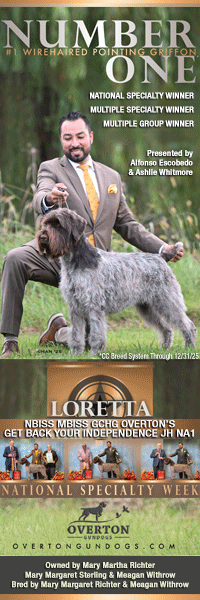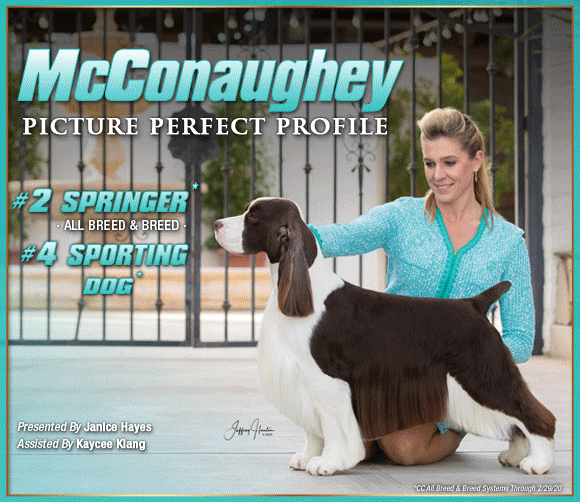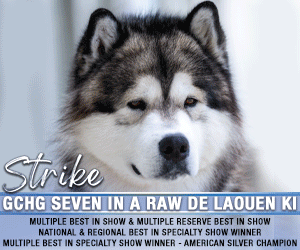Putting Things in Perspective
by Buris R. Boshell, M.D.
From the archives of The Canine Chronicle, August 1993
Wake up man, you’re dead! This is the kind of shock I had when my physician said, “You have cancer of the colon” in May of 1993 and after two bouts of quick surgery, one in Birmingham and a final one (I hope) at MD Anderson, I began to really think about what life is all about and to decide what I could do to get the very most out of every day. One of the first things that came to mind was to do another edition of Your Miniature Pinscher published by Denlinger in the 1960s and to do the third edition of my book on diabetes mellitus. Both of these are well underway.
I wrote all the Toy judges and sent a questionnaire to get their ideas about the Min Pin in Toy competition–how they prefer the dog be handled, how much of their judging was done on the table versus the floor, etc. Overall response has been good, but I could use more.
This information should give our breeders and exhibitors an idea how they can improve their performance in the show ring.
I also wrote all members of the Miniature Pinscher Club of America and sought information about their breeding programs, top winners, etc., and have had excellent response. There appears to be considerable disagreement as to whether or not the breed has improved during the past twenty years.
Now to the main topic of perspectives. How many people are fortunate enough to have a daily job that they thoroughly enjoy? As a physician, I see all too many who hate to go to work. Fortunately, I am thrilled every day to have the opportunity to take care of patients.
Some people who are unhappy with their vocation seek an avocation that will provide the satisfaction that they are not getting out of their work. Some of these choose dogs.
And I have answered the second question several times by saying, “All that you have to do is get a dog that is better than your competition.”
If they choose dogs because they truly enjoy them and want them as pets, this is great; however, some substitute the dogs for their children and everything else in life and totally lose perspective; unfortunately some of these choose to show dogs and many become problem exhibitors.
Showing their dog, to them, is emotionally charged like they are showing their child. They are certain their child and dog are perfect, and can any stupid judge not agree? This person should ask himself why he is showing dogs and try to be objective about the reasons. If they enjoy competing and can stand the heat of both winning and losing, they can realize real pleasure out of the game and make a contribution to the dog show. A poor loser spoils the day for everyone: the judge, the AKC rep and their competitors. I have heard some of the latter say to the judge, “How could you not put up my dog?” or “What must I do to win under you?” One judge was heard to reply to the first question by saying, “Lady, your dog is just like you, he has no manners.” And I have answered the second question several times by saying, “All that you have to do is get a dog that is better than your competition.”
Another aspect of showing dogs is that of finances. Certainly, in the United States the entry fees continue to go up. When you couple this with gasoline, motel and food bills, a dog show weekend can be quite expensive. One must first of all, therefore, determine whether or not they can truly afford this sport. I have seen many people actually use money that they need for food, clothing, children’s education and so forth and show dogs instead and let the other things go wanting. This certainly is losing perspective and something that someone should seriously question. There are, of course, many people in the United States who have plenty of funds to support a dog, either by showing themselves or supporting the fees of a professional handler. Here again, one must consider what the output is and what enjoyment they get out of this. I have personally found it not terribly rewarding to send a dog out with a handler who did not keep in close contact with me and keep me posted on the wins of the dog. I have also requested that handlers not only call me when they win but call me when they lose; call collect where their only expenditure is only a little bit of time. It is very difficult to get this across to a handler to realize that your only enjoyment when you are absent from the show is that of being able to talk with them about what went on. As I have grown older, I have gotten more selective and tend to drop a handler that refuses to communicate. Again, from my perspective I thoroughly enjoy the competition and I actually enjoy showing myself when time permits, I prefer to actually be present and enjoy the thrill of competition, win, lose or draw.
Time is the most valuable thing that any of us have along with good health. When the latter comes into question, one must even ration the time more carefully. Although I have thoroughly enjoyed judging dog shows throughout the world, I decided because of my illness that I would not judge any more shows during 1993, and I would be certain in talking with my physician to be sure that my prospects for being in shape to perform well at a dog show in 1994. As a matter of fact, my surgeon has given me permission to go ahead and start showing horses again in competition, and I will show for the first time this weekend.
I feel, other than just good upbringing and giving good guidelines to our children and grandchildren, that education is the most important thing we can confer to these youngsters and certainly I think it would be a great mistake to deprive the children of a good education because of showing dogs. College is becoming more and more expensive and certainly because of problems in the public schools, many people find it necessary to send their children to private schools instead, which of course adds additional expense.
One of the problems I have found in sending a good dog out for long term with a professional handler is that both the dog and handler become very much attached to each other that even though you may want the dog back for your breeding program and so forth, it sometimes is emotionally very difficult to make the separation. Again, this is something to give serious consideration to if you are sending a top dog that you need in your program for long term breeding.
I feel the most important thing, as far as the exhibitors or breeders are concerned, is to be sure they really can be objective not only about their own dog but about the competition and that they can win or lose with grace. Furthermore, it is quite important that they not use funds they need very badly for the simple factors of food, clothing, education and so forth.
“I have personally found it not terribly rewarding to send a dog out with a handler who did not keep in close contact with me and keep me posted on the wins of the dog.”
Now from the standpoint of judging, why does a person want to judge? I am sure there are many reasons, and as a matter of fact, the only good reason I could come up with was that I thoroughly enjoyed the opportunity to go over an outstanding specimen; and since it was certainly not possible to own all of them, I got the vicarious pleasure of seeing them in the show ring. On the other hand, one must take into consideration that, perspective-wise, judging takes a lot of time, is certainly not economically rewarding, and if it is not emotionally rewarding, perhaps one should not bother.
Another factor is the importance of realizing the obligations that a judge has. Judges can very markedly influence the breeding programs by whom they select as top winners. A real honest breeder only wants the judge’s honest opinion and they have a right to expect the judge to be knowledgeable of the dogs they are judging. I have seen an occasional judge be very flippant and very cursory in their decision-making, and of course, this is not fair to the exhibitor who has paid his entry fee and all the other expenses nor is it helping a particular breed. I feel that a judge should study the standards carefully, talk with individuals who have shown outstanding specimens of a various breed, and become as knowledgeable as they possibly can. Certainly seminars, videotapes and so forth can be helpful from this educational standpoint. Just as important, when they go into the ring they should go in with an open mind and make a serious effort to find the very best dog there. I am always unimpressed when I see a judge who is trying to be the great discoverer and is always picking up some young puppy to put over top quality adults. This has happened to me on several occasions when I knew I had an ordinary puppy but had an outstanding Special. Again, this was total lack of perspective as far as the judge was concerned. First of all, he or she should have known the breed better, and secondly, they should understand many things can happen to a puppy and for a puppy to go over a real top quality special, the puppy has got to be truly outstanding and deserving.
Another area, of course, that is quite important in the dog show game is that of advertisement. Again, the question is how much or how little, or do you advertise at all? We had the experience with a very nice young Doberman I purchased as a young pup, Ch. Sherluck’s Drumfire, of having a handler, Bob Hastings, take him to the top with no advertising whatsoever. As a matter of fact, he finished at twelve months of age and then went on to some very nice wins without the push and pressure of advertising. I am not recommending, however, that this is the most appropriate way to do things. First of all, if you are a breeder and realize you cannot keep all of your puppies and want to market, certainly advertising helps in this regard. Furthermore, I have nothing against bragging a little bit when you get a good win and advertising helps you in this regard. And furthermore, I think if the handler works hard, shows your dog well and gets some nice wins, it is good advertising for the handler as well and something he or she deserves. Additionally, if one works with a top-quality magazine, you usually find real experts that are putting the paper out. And they can be extremely helpful in advising you as to how the ad should be placed, and in addition, through their travels and so forth, if you are looking for top breeding stock, they can be helpful in many ways. Certainly, I have found the staff of The Canine Chronicle to be extremely helpful as well as being extremely qualified in what they are doing.
In summary, perspective is what it is all about. If one is going to truly enjoy it, they have to keep the total dog show game in perspective. First of all, question why they do it, and is it worth doing, and can they afford it. If they can answer “yes” to all of these, then I say, “GO FOR IT!”
Short URL: https://caninechronicle.com/?p=182980
Comments are closed














